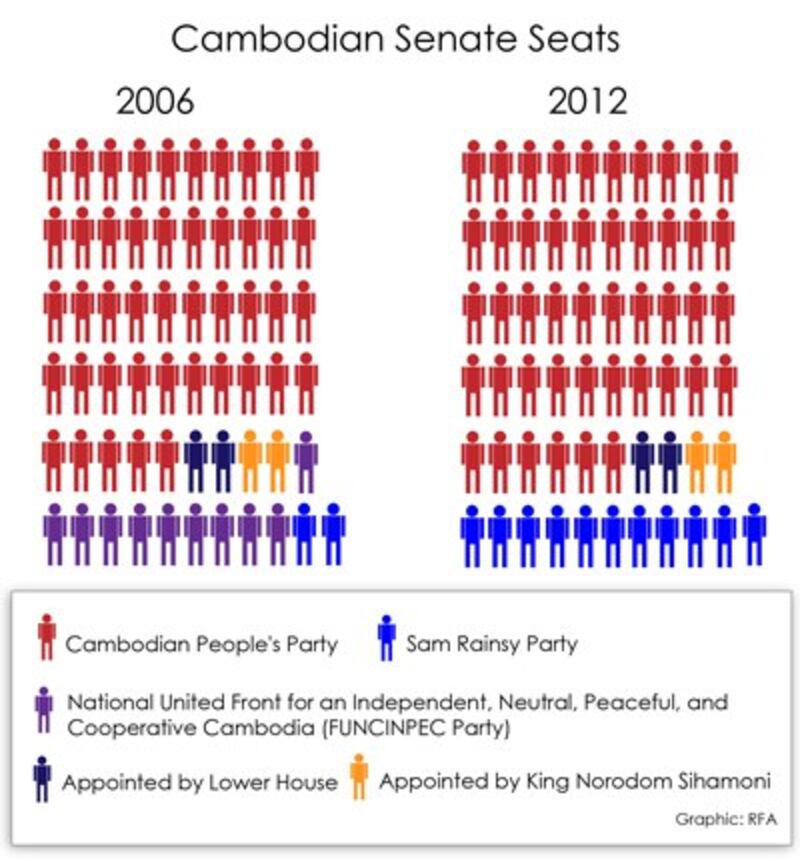Cambodia’s ruling party scored a decisive victory in weekend Senate elections, but the country’s main opposition party also has made significant gains by increasing its number of seats from two to 11, despite an election system stacked against it amid widespread corruption allegations.
Prime Minister Hun Sen’s Cambodian People’s Party (CPP) won nearly 78 percent of the Senate’s 61 seats based on preliminary results, increasing its share to 46 seats from 45 won in the country’s first-ever senate elections held in 2006. The CPP’s dominance was widely expected by local monitoring groups who criticized the vote for being closed to the public.
The opposition Sam Rainsy Party (SRP) won the remaining 22 percent, increasing its number of seats to 11 from two in the previous 2006 election.
Some 11,300 local officials and members of the lower house, or National Assembly, voted to fill 57 of the Senate seats. Two more senators are appointed by King Norodom Sihamoni and another two by the CPP-dominated National Assembly.
The opposition royalist FUNCINPEC Party, which had won 10 seats in the previous polls, declined to run for the election, along with the Human Rights Party and the Norodom Ranariddh Party. All three parties have registered commune councilors, but lacked sufficient votes at the provincial level to gain Senate seats.
The Senate has no veto power and is widely viewed as a rubber-stamp institution that approves draft bills submitted by the National Assembly before they are signed into law by the king.

Senate gains
SRP lawmaker Kuy Bunrouen said that the preliminary results spoke to an increased loyalty amongst the party’s 2,660 commune councilors who voted in the elections. Only 157 of the SRP’s commune councilors did not vote for their registered party.
“This is a big victory for us,” he said. “This shows that the commune councilors are more loyal to the party than during the previous Senate election.”
Sam Rainsy, the exiled head of the SRP, also accused the CPP of interference in the elections, saying his party’s increased number of seats represented a victory despite what he called illegitimate poll practices.
“The CPP controls the national committee that organizes the elections, which makes all kinds of manipulation possible,” he charged in a statement on Sunday.
The CPP also controlled all the television stations as well as the country's administrative machinery, the police and the judiciary and “does not hesitate to use these tools to weaken the SRP through harassment, intimidation and the buying of votes,” the statement alleged.
“This makes the opposition's success today all the more remarkable.”
The statement went on to say that the SRP had continued to gain support despite the fact that the party’s leader is living in exile.
Prime Minister Hun Sen on Tuesday accepted the election results in a nationally televised speech.
“The CPP definitely accepts the election results and I would like to thank the CPP commune councilors and lawmakers who voted for the party,” Hun Sen said.
“I would also like to thank the FUNCINPEC Party, Norodom Ranariddh Party, and Sam Rainsy Party commune councilors who voted for the CPP,” he said, adding that the CPP received nearly 800 votes from the nonparty members out of a total of 8,880 votes.
The SRP lost some votes to the CPP but gained others from the Norodom Ranariddh Party.
Vote criticized
Monitoring groups, meanwhile, criticized the election process for “failing to operate independently” of government influence.
Committee for Free and Fair Elections in Cambodia Director Koul Panha also called the Senate “powerless” in its role of examining draft laws submitted by the National Assembly.
“The Senate sometimes approves draft laws without even changing any words,” Koul Panha said.
He added that while the two parties accepted the poll results, the government should amend Cambodia’s election laws to have the Senate chosen through a general election open to the public.
National Election Committee Secretary General Tep Nytha responded to criticism over the closed elections by saying that the Senate is chosen in a manner “specific to Cambodia’s situation.”
“This is a nongeneral election. It allows elected commune councilors to elect the senators,” he said.
Cambodia’s 23 provinces are divided into districts, which are further divided into communes. There are 1,621 communes in Cambodia with each Commune Council composed of 5 to 11 members depending on demography and geography.
Reported by RFA’s Khmer service. Translated by Samean Yun. Written in English by Joshua Lipes.
